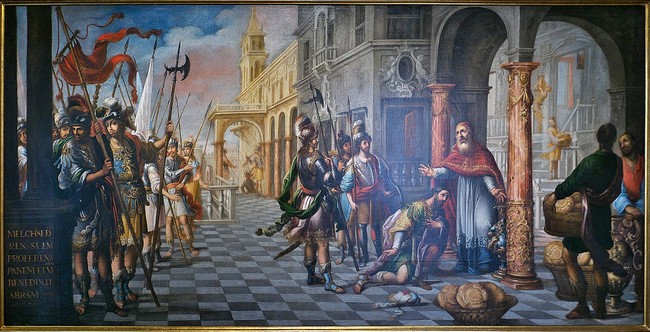
I would argue that no minor Bible character has more influence than Melchizedek. He is active in only one story. Abram (later Abraham) encounters him after the patriarch defeated the king of Elam:
After his return from the defeat of Chedorlaomer and the kings who were with him, the king of Sodom went out to meet him at the Valley of Shaveh (that is, the King’s Valley). And Melchizedek king of Salem brought out bread and wine. (He was priest of God Most High.) And he blessed him and said, “Blessed be Abram by God Most High, Possessor of heaven and earth; and blessed be God Most High, who has delivered your enemies into your hand!” And Abram gave him a tenth of everything.
Genesis 14:17-20 (ESV)
Here’s what scholars know about Melchizedek. Michael C. Astour explains in the Anchor Yale Bible Dictionary that “The meaning of the name is ‘King of Righteousness,’ which is stressed by its being written in Gen 14:18-20 and in Ps 110:4 in two parts joined by a maqqēp, as if it were a title rather than a personal name. He is described as king of Salem and priest of God Most High (ʾēl ʿelyôn).”
Astour adds that Melchizedek’s appearance in Genesis “affirms that the priesthood of the supreme God, the creator of the world, had existed in Jerusalem not since Solomon but from before Abram’s arrival in the promised land; that the priest of God Most High was at the same time the king of the city; and that Abram, who by his victory over Chedorlaomer, the former overlord of the country between Dan and Elath, had inherited his rights to it, paid a tithe to Melchizedek, thus acknowledging his superiority.”
His name appears again in one of King David’s Messianic psalms. In Psalm 110:4, he writes, “The LORD has sworn and will not change his mind, ‘You are a priest forever after the order of Melchizedek.’”
As for David’s words about Melchizedek, the ESV Study Bible notes, “The Davidic king is to be ‘after his order,’ i.e., like him, probably in the sense that he is both a king and a priest (these are two distinct offices in Israel), ruling in Jerusalem (cf. Zion, Ps. 110:2). The prophet Zechariah foresaw a merger of these two offices in the person of the Messiah, or ‘the Branch’ (Zech. 6:9–14). Since the OT records this of no other king of David’s line, this shows that the psalm is primarily about the final king, the Messiah.”
Related: Sunday Thoughts: The Symmetry of God’s Plan of Redemption
But Melchizedek’s significance comes to life in the book of Hebrews. The author is writing about Jesus’ priestly role when he writes:
So also Christ did not exalt himself to be made a high priest, but was appointed by him who said to him, “You are my Son, today I have begotten you”; as he says also in another place, “You are a priest forever, after the order of Melchizedek.” In the days of his flesh, Jesus offered up prayers and supplications, with loud cries and tears, to him who was able to save him from death, and he was heard because of his reverence. Although he was a son, he learned obedience through what he suffered. And being made perfect, he became the source of eternal salvation to all who obey him, being designated by God a high priest after the order of Melchizedek.
Hebrews 5:5-10 (ESV)
“He is without father or mother or genealogy, having neither beginning of days nor end of life, but resembling the Son of God he continues a priest forever,” the author continues in Hebrews 7:3-4. “See how great this man was to whom Abraham the patriarch gave a tenth of the spoils!”
“Now if perfection had been attainable through the Levitical priesthood (for under it the people received the law), what further need would there have been for another priest to arise after the order of Melchizedek, rather than one named after the order of Aaron?” the author asks in Hebrews 7:11.
But finally, the author points out the superiority of Jesus’ priesthood when he writes:
…but this one was made a priest with an oath by the one who said to him: “The Lord has sworn and will not change his mind, ‘You are a priest forever.’” This makes Jesus the guarantor of a better covenant.
Hebrews 7:21-22 (ESV)
“The new, better covenant based on Jesus’ eternal high priesthood comes with God’s oath and with Jesus as the guarantor, and thus it is superior to the Mosaic covenant,” the ESV Study Bible explains.
In “Daily Doctrine,” Kevin DeYoung quotes Francis Turretin to explain:
Although Christ fulfilled the work of the Levitical priesthood, the New Testament stresses that Christ was a priest after the order of Melchizedek (Ps. 110; Heb. 7). Turretin highlights several differences between the two priesthoods. One came from Aaron, the other from Melchizedek. One was associated with the Mosaic administration, the other with Abraham. One had a derivative power, the other had power in itself. One was temporal and of finite value, the other eternal and of infinite value. In short, the two differ in persons, in institution, in efficacy, in perfection, and in duration.
It’s easy to conclude that Melchizedek is a type (a forward-pointing symbol) of Jesus. He foreshadowed what was to come with Jesus’ arrival on earth, His ministry, and His death, burial, and resurrection. Not bad for a guy who pops into a handful of verses.
Want more biblical depth with your Sunday reading? This week’s column explores how Melchizedek — briefly mentioned in Genesis — points us to Jesus and the better covenant. It’s a powerful reminder of the symmetry in God’s plan of redemption.
Want more content like this? Most of our podcasts and deeper dives are for VIPs only, but “Faith All Over the Place” remains free thanks to our VIPs’ support. Join the team today with 60% off using the promo code FIGHT and help us keep the good stuff coming.





